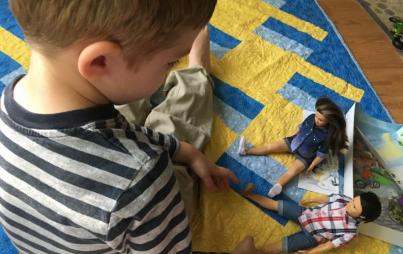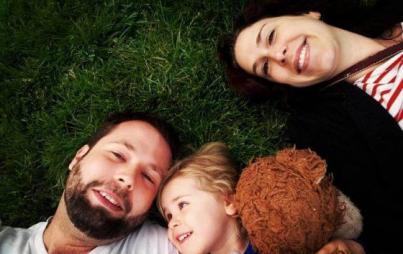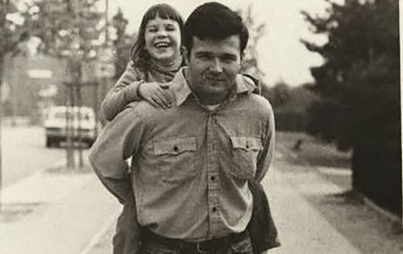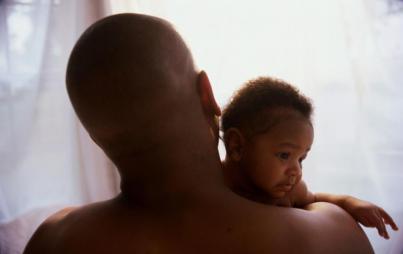
Thinkstock
As a feminist, and father of two girls, I am hyper-vigilant about how gender and sexism pervade everything, and I try to correct, or at least challenge this reality. However, the truth is that I too am a "bad feminist" and have, despite my upbringing in a radical feminist home, been deeply influenced by the broader culture. When I have moments to breathe and reflect on the language I use in front of my daughters, I find that I often employ the male default.
* * *
"Hey guys," I hear myself calling out to my daughters on a recent weekend day. "What do you want to do today?"
"Hey guys," I shout across the room at my wife, and my mother and her wife. "What are we getting for dinner?"
"There are no guys here" my mom swiftly points out. Touché. "You're right," I respond.
* * *
I am in the Central Park Children's Zoo with my daughters. Inside, a duck suddenly crosses near our path. "Look, a duck!" I shout to my 2-year-old. "Where?" she asks. "There he is" I say while pointing. Unimpressed, my girls run for the sheep and alpacas and beg to feed them. I fumble to find the quarters and buy the food. My little one hesitates as she nears the pen. "Go on, give it to him" I encourage as a sheep reaches for her hand.
The goats are next. I buy more food and we find an opening in the always busy goat pen. "Don't be scared of him" I say to one or both of my daughters as they keep a healthy distance from goat horns.
We manage to make the sea lion feeding and show. My daughters are laughing as the sea lions bark on command. After a particularly amazing trick I turn to them and say "wow, look how high he jumped." Another sea lion disappears under the water and I see my daughters following its path. "There he is" I tell them.
* * *
My daughters and I are standing under the massive Blue Whale at the Museum of Natural History. "He is so large. He's the largest animal on Earth" I instruct them. This trend continues as we run past polar bears and walruses and penguins. "What is he?" I quiz when we reach a certain species. "What do you think he eats?" I ask.
Upstairs in the dinosaur hall, we stand in awe of T-Rex. "He has such big teeth" I say. "Do you remember what he's called?' I ask my 4-year-old as I point to a Triceratops. And, when we see the Apatosaurus, I exclaim, "guys, look how long his tale is. It's huge!"
* * *
I'm at home reflecting on how often I use male pronouns after a session of playing with stuffed animals; I've assumed they are all male unless told otherwise. How can this be the case since I was raised by women, continue to be surrounded by them, have read countless feminist works and female authors, and try to be thoughtful about language?
It is obvious once you begin to look that the male default can be found everywhere. Male pronouns in common speech easily outnumber female ones. Think of God, who is nearly always described as male. Male as a default can also be found in films, TV shows, games, books, public signage—you name it. Think for a moment about a blank slate character in any medium with no gendered attributes. Do you assume it is male unless you are given clear markers of femininity? What is the difference between Mickey and Minnie Mouse? Mickey is the default; Minnie is Mickey with eyelashes and a bow in her hair.
Forget characters. I have seen first hand that people assume an infant child is male unless they see the color pink on the child's person, or a barrette, or a headband, or an earring (Dress a girl in blue and the matrix begins to crack). People are afraid to ask a child's sex and prefer to assume maleness. The default is comfortable. Engaging in true conversation less so.
It's my children's bedtime and I happen to spot "Dear Zoo," a classic lift-the-flap children's book by Rod Campbell. I sit on the floor reading the book to my 2- year-old and my eyes widen with each turning page. Every animal—every single animal—that the zoo sends to the protagonist of the book is male. The elephant ("he was too big"), the giraffe (" he was too tall"), the lion ("he was too fierce"), the camel ("he was too grumpy"), the snake (" he was too scary"), the monkey ("he was too naughty"), the frog ("he was too jumpy"), and the puppy ("he was perfect") are all male.
I jump up and scan the shelves. I spot "If You Give a Mouse a Cookie" and read only the second line of the book: "He's going to ask for a glass of milk." It's the same with "If You Give a Dog A Donut" and "If You Give A Cat A Cupcake." I switch to the "How Do Dinosaurs" series, settling on "How Do Dinosaurs Clean Their Rooms?" and don't need to read past the first line which asks: "How does a dinosaur clean up his room?"
I breathe a sigh of relief when I find some books that don't follow this pattern. Goodnight Moon. One Fish Two Fish Red Fish Blue Fish. Brown Bear, Brown Bear, What Do You See? Don't Let The Pigeon Drive the Bus. A bunch of books by Sandra Boynton.
What do these books do instead of employing a male default? They use pronouns like "they" or describe creatures as "this one" or multiple beings as "some." And sometimes they say nothing at all—a bear is a bear, a pigeon is simply a pigeon.
After perusing these books, I am almost relieved. No matter how feminist one's upbringing, we learn the male default when we are first exposed to language. This default pervades children's books, television shows, and movies. This is why the language they employ is especially significant. From the beginning, through this subtlety, we learn that males are important and "normal," and that females are lesser and abnormal. Female characters then become special because we judge them based on their gender while male characters are judged based on things other than gender, making them more human and multi-dimensional.
There is no doubt that we need more diverse books, including more stories featuring female protagonists, and stories that allow those characters to be multi-dimensional. I love reading those kind of books to my daughters. At the same time, I now wonder whether "genderless" books such as the ones I've mentioned are another way to help us move away from the male default. While there is a risk of filling in gender with the male default, "genderless" books also present an opportunity to question our children about why they gendered a certain character or why knowing a character's gender is important. We can even suggest not gendering the character at all. With more of both of these kinds of books out there, there's a chance future children will have no default pronouns at all.
* * *
Parenthood sometimes offers a chance at redemption and always provides teachable moments. As I was thinking about this piece while holding my female cat, my 2-year-old told me that the cat wanted something. "He wants to smell my hand" she suggested. "No, sweetheart" I answered, "we say she because Lucy's a girl."
"And she wants me to let her go," I added.







